|
|
 |
 |
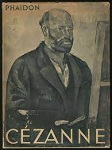
|
| Cézanne
|
Fritz Novotny 150:-
Paul Cézanne (1839-1906) has been acclaimed by the twentieth century as the father of modern art. This superb volume surveys the life and work of an extraordinary painter, who trod a solitary and difficult path towards his goal of an art which would combine the best of the French classical tradition of structure with the best in contemporary realism. The results are some of the most beautiful, and most popular, paintings of our time.
Among the 48 full-page colour plates are examples of Cézanne's monumental landscapes, richly modelled figure groups, and marvellous still lifes, so remarkable for their geometric compositions and their stunning use of colour.
|
|

|
| Charles Bukowski - Shakespeare never did This
|
(Black Sparrow UK 1996 SC 225:-)
An account of Charles Bukowski's 1978 European trip. In 1978 Europe was new territory for Bukowski holding the secrets of his own personal ancestry and origins. En route to his birthplace in Andernach, Germany, he is trailed by celebrity-hunters and paparazzi, appears drunk on French television, blows a small fortune at a Dusseldorf racetrack and stands in a Cologne Cathedral musing about life and death.
|
|
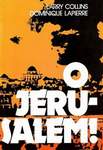
|
| Collins & LaPierre - O Jerusalem!
|
(Simon & Schuster US 1972 HC/DJ 60:-)
This book recounts, moment by moment, the process that gave birth to the state of Israel. Collins & Lapierre weave a tapestry of shattered hopes, valor & fierce pride as the Arabs, Jews & British collide in their fight for control of Jerusalem. O Jerusalem! meticulously recreates this historic struggle. It penetrates the battle from the inside, exploring each party's interests, intentions & concessions as the city of their dreams teeters on the brink of destruction. From the Jewish fighters & their heroic commanders to the charismatic Arab chieftain whose death in battle doomed his cause but inspired a generation of Palestinians, O Jerusalem! tells the 3-dimensional story of this high-stakes, emotional conflict.
|
|

|
| Donald, David Herbert - Lincoln
|
(Jonathan Cape US 1995 HC/DJ 80:-)
A masterful work by Pulitzer Prize–winning author David Herbert Donald, Lincoln is a stunning portrait of Abraham Lincoln’s life and presidency.
Donald brilliantly depicts Lincoln’s gradual ascent from humble beginnings in rural Kentucky to the ever-expanding political circles in Illinois, and finally to the presidency of a country divided by civil war. Donald goes beyond biography, illuminating the gradual development of Lincoln’s character, chronicling his tremendous capacity for evolution and growth, thus illustrating what made it possible for a man so inexperienced and so unprepared for the presidency to become a great moral leader. In the most troubled of times, here was a man who led the country out of slavery and preserved a shattered Union—in short, one of the greatest presidents this country has ever seen.
|
|

|
| Franken, Al - Rush Limbaugh is a Big Fat Idiot
|
(Delacorte US 1996 HC/DJ 50:-)
Rush Limbaugh claims his talent is on loan. With this book, Franken demonstrates that he owns. The frankly Democratic author's shtick reminds us how much of a free ride conservatives have gotten in the mainstream media. For instance, he really drives home the weirdness of the conservatives' preachiness about "family values" in light of Newt Gingrich's and Bob Dole's first marriages, and Rush Limbaugh's first, second and third marriages. And he has great fun with Rush's and Newt's miraculous draft deferments in a chapter where he imagines all of the great conservative "chicken-hawks" out on a Vietnam war patrol under the leadership of Ollie North.
|
|

|
| Franken, Al - Why not me?
|
(Delacorte US 1999 HC/DJ 50:-)
In this hilarious political satire, Al Franken reveals how, by focusing relentlessly on the issue of ATM fees, he managed to wrest the Democratic presidential nomination away from Vice President Al Gore in the 2000 elections and become the 44th president of the United States. He then wound up running the second-shortest administration in American history, announcing in his resignation speech: "It is my fondest wish that, in the fullness of time, the American people will look back on the Franken presidency as something of a mixed bag and not as a complete disaster.
|
|

|
| Levin, Mark R - American Marxism
|
(Threshold US 2021 HC/DJ 100:-)
In 2009, Mark R. Levin galvanized conservatives with his unforgettable manifesto "Liberty and Tyranny", by providing a philosophical, historical, and practical framework for halting the liberal assault on Constitution-based values. That book was about standing at the precipice of progressivism’s threat to our freedom and now, over a decade later, we’re fully over that precipice and paying the price.
In "American Marxism", Levin explains how the core elements of Marxist ideology are now pervasive in American society and culture—from our schools, the press, and corporations, to Hollywood, the Democratic Party, and the Biden presidency—and how it is often cloaked in deceptive labels like “progressivism,” “democratic socialism,” “social activism,” and more. With his characteristic trenchant analysis, Levin digs into the psychology and tactics of these movements, the widespread brainwashing of students, the anti-American purposes of Critical Race Theory and the Green New Deal, and the escalation of repression and censorship to silence opposing voices and enforce conformity. Levin exposes many of the institutions, intellectuals, scholars, and activists who are leading this revolution, and provides us with some answers and ideas on how to confront them.
|
|

|
| Michener, James A - Michener's USA
|
(Crown US 1981 HC/DJ 100:-)
A personal and pictorial view of five regions of the United States includes conversations with residents of each region on present-day social, economic, political, and cultural events and trends.
|
|
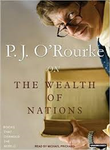
|
| O'Rourke, P.J. - On "The Wealth of Nations"
|
(Atlantic US 2007 HC/DJ 80:-)
The famous satirist headlines a new series of Books That Changed the World," in which well-known authors read great books "so you don't have to." While irreverently dissecting Adam Smith's 18th-century antimercantilist classic, The Wealth of Nations, O'Rourke continues the dogged advocacy of free-market economics of his own books, such as Eat the Rich. His analysis renders Smith's opus more accessible, while providing the perfect launching pad for O'Rourke's opinions on contemporary subjects like the World Bank, defense spending and Bill Moyers's intelligence (or lack thereof, according to O'Rourke). Readers only vaguely familiar with Smith's tenets may be surprised to learn how little he continues to be understood today.
|
|
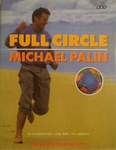
|
| Palin, Michael - Full Circle
|
(BBC UK 1997 HC/DJ 100:-)
Michael Palin's "Full Circle" trip involved traveling all of the way around the Pacific Ocean. He (and his film crew) started at the Bering Strait in Alaska and then traveled down the Asian side of the Pacific, crossed over to Cape Horn, and traveled up through South and North America, returning to Alaska.
The trip covered 50,000 miles through 17 countries in ten months. Specifically, these countries were visited: USA (Alaska), Russia (Siberia), Japan, S. Korea (entry to N. Korea was denied), China, Vietnam, Philippines, Malaysia, Indonesia, Australia, New Zealand, Chile, Bolivia, Peru, Colombia, Mexico, USA (California and Washington), Canada (British Columbia) and back to Alaska again.
This trip, like the other ones done by Michael Palin for the BBC, was filmed for viewing as a television mini-series. (This version is available on DVD.) Afterwards, Michael Palin and Basil Pao (the stills photographer in the filming crew) created this book as an alternative record of the trip.
The book is richly illustrated with Basil Pao's beautiful photographs. Michael Palin's text is wonderful because he has a way of finding interesting places and people and of describing them with warmth and humor.
|
|

|
| Patti Smith - Devotion
|
(Windham-Campbell UK 2017 HC/DJ 100:-)
A work of creative brilliance may seem like magic—its source a mystery, its impact unexpectedly stirring. How does an artist accomplish such an achievement, connecting deeply with an audience never met? In this groundbreaking book, one of our culture’s beloved artists offers a detailed account of her own creative process, inspirations, and unexpected connections.
Patti Smith, a National Book Award-winning author, first presents an original and beautifully crafted tales of obsession.
|
|

|
| Queenan, Joe - Balsamic Dreams
|
(Henry Holt US 2001 HC/DJ 60:-)
What distinguishes the baby boomers? According to film and social critic Queenan (Red Lobster, White Trash, and the Blue Lagoon) in this witty, sardonic and heartfelt paen to his fellow aging boomers, they weren't the first generation to sell out "but they were the first generation to sell out and then insist that they hadn't." Deftly distilling the impact of a wide range of events in popular culture, he cites April 21, 1971, as one of "ten days that rocked the world" for boomers, with the release of Carol King's album Tapestry. Meanwhile, recent films such as What Lies Beneath and The Haunting appeal to boomers, he observes, with the message, "Just because you're dead doesn't mean you can't get your life organized." And, he asks, won't someone "admit that La Vita e Bella is Holocaust-denying crap?"
|
|

|
| Queenan, Joe - Imperial Caddy
|
(Hyperion US 1992 HC/DJ 60:-)
Quayle-bashers will find this literary pummeling of their man an unalloyed joy. Syndicated Washington Post columnist Queenan has done his homework and not lost his sense of humor while doing it. He begins by citing media descriptions of the vice president as a dimwit, a pinhead, a dolt, a chowderhead--and those appellations are just for starters. Then he goes to work on Quayle's home state of Indiana and the oddballs it has produced, from Ku Klux Klansman D. C. Stephenson through the Rev. Jim Jones to Axl Rose. Queenan determines that the state's native sons are a strange mixture of gullibility, mediocrity and weirdness.
|
|

|
| Queenan, Joe - My Goodness
|
(Hyperion US 2000 HC/DJ 60:-)
Everyone loves a funny misanthrope: Voltaire, Mark Twain, Roseanne Barr. And combative movie critic Queenan (Red Lobster, White Trash and the Blue Lagoon) can be funny. In this memoir of attempted self-salvation, Queenan charts his attempts to drop his disputatious demeanor and become a nicer, if not better, person. As he admits, it's a hard journey, since his "financially remunerative niche as one of the handful of hired guns" who can "turn out a fast, efficient hatchet job" ostensibly hangs in the balance. He's at his best when contemplating how bad he has actually been, and when he measures the "obviously satanic people I have made fun of" against "unlikely people I have defended."
|
|

|
| Queenan, Joe - Queenan Country
|
(Henry Holt US 2004 HC/DJ 50:-)
Who knew that Joe Queenan--who years ago called the English "pasty-faced, mean-spirited, stingy, badly-dressed, anal-retentive, unfriendly, unadventurous, unimaginative people"--could bring himself to write this book-length love letter to the "mother country." Perhaps his English wife of 25 years finally softened him up. He fights the Joe Queenan fight: railing here against Paul McCartney, Pre-Raphaelites, Cats, English haircuts and public transportation, Fergie, Chelsea football supporters, Rod Stewart's Great American Songbook, and more. But the complaints are outnumbered by Queenan's love of a nice cup of tea, England's circuitous roads and stone houses, its writers (Swift, Dryden, Pope, Boswell, Samuel Johnson), its domestic niceties, and its "ebulliently shabby pubs." Queenan's is not a quickie romance; nor is this book an afterthought. It is written with the depth and detail of someone who's paid attention to his subject for a long time.
|
|

|
| Queenan, Joe - Red Lobster, White Trash...
|
(Hyperion US 1998 HC/DJ 60:-)
For fourteen years, critic Joe Queenan walked past the Winter Garden Theater in New York City without once even dreaming of venturing inside to see Cats. One fateful afternoon in March 1996, however, having grown weary of his hopelessly elitist lifestyle, he decided to buy a half-price ticket and check out Andrew Lloyd Webber's record-breaking juggernaut. No, he did not expect the musical to be any good, but surely there were limits to how bad it could be.
Here, Queenan was tragically mistaken. Cats, what Grease would look like if all the cast members were dressed up like KISS, was infinitely more idiotic than he had ever imagined. Yet now the Rubicon had been crossed. Queenan had involuntarily launched himself on a harrowing personal oddyssey: an 18-month descent into the abyss of American popular culture...
|
|

|
| Queenan, Joe - True Believers
|
(Henry Holt US 2003 HC/DJ 50:-)
"To me, the Phillies and Eagles are exactly like nicotine:," writes Joe Queenan in his painful and deeply funny book True Believers: The Tragic Inner Life of Sports Fans, "a preposterously noxious semi-hallucinogenic substance capable of giving great pleasure for brief periods of time, but that will ultimately destroy your health." Targets of Queenan's blowtorch mockery in previous books have included Hollywood, chain restaurants, and baby boomers. But here, he shines the spotlight on himself in an extended examination on what it means to join in the unique self-flagellation that is sports fandom. That flagellation is made more painful when, as in Queenan's case, the fan has sacrificed their time, emotional well-being, and regard among family members to following teams that often suck real bad.
|
|

|
| Renoir
|
Michel Florisoone 150:-
A leading member of the impressionist movement, Pierre Auguste Renoir (1841-1919) exhibited regularly at the annual Salons, where he strove to enliven an establishment that had become stodgy with academic and history painting.
Renoir's paintings of Parisians engaging in leisurely pasttimes, enjoying their dejeuner under a pergola or beside the Seine at an open-air cafe, sailing, swimming, picnicking, and dancing at one of the many halls in towns outside of the city, are imbued with a sense of conviviality and joie de vivre that was wholly new to the Salons.
|
|
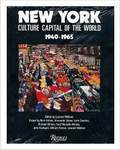
|
| Wallock, Leonard - New York
|
(Rizzoli US 1988 HC/DJ 120:-)
A skillful appraisal of a period of unparalleled creativity that marked New York City as the cultural center of the world. Housing developments and urban fiction, jazz and modern dance, political protest and mixed media productions--all are subjects for study by an impressive group of experts. They show how the city, accommodating a "ceaseless flow of talent" in an aura of unlimited possibilities, provided both the raw materials and the intellectual ferment needed for new ways of thinking and of expressing images and ideas. There is a nostalgic look to the work, with extensively annotated illustrations of the familiar and slightly historic--images of expectation and enthusiasm in a city in which everything was happening and everything was new. An important record of a singular time.
|
| | |
|
|
|
|


